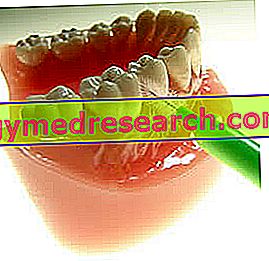Related articles: Tonsillary calculations
Definition
Tonsil stones (or tonsilloliths) are concretions that develop in the crypts of the tonsils (the crypts are small pockets present on the surface of these lymphoglandular organs).
The tonsilloliti are composed of calcifications that incorporate dead mucosal cells, bacteria, food particles and white blood cells that attack these elements to defend the body.
Tonsillolites tend to arise more frequently in people affected by recurrent inflammatory processes (eg repeated attacks of tonsillitis or chronic tonsillar inflammation), which produce ideal conditions for their growth in the tonsil crypts.
The formation of tonsillolites can also be favored by possible infections of the oral cavity and the upper airways.
Most common symptoms and signs *
- Halitosis
- Dysphagia
- Sore throat
- odynophagia
- Throat Plates
- Intense salivation
Further indications
Tonsil stones appear as solid formations of a white-yellowish color, with a consistency that varies from soft and friable to hard.

Tonsil calculus. Image taken from Wikipedia.org
The tonsillolites generally have a size of 1-3 millimeters and are asymptomatic. However, when the stones reach larger dimensions they can cause halitosis and a foreign body sensation near the tonsils. Often, tonsillolites are mistaken by the patient for bacterial plaques.
Other symptoms may include sore throat, dysphagia, ear pain during swallowing (odynophagia) and swelling of the tonsils.
Diagnosis is based on clinical evaluation. In many cases, tonsillar stones do not need any treatment, since the concretions can resolve spontaneously. When infectious processes are found, tonsillolites can be treated with antibiotics or, if symptomatic, with surgical removal.



